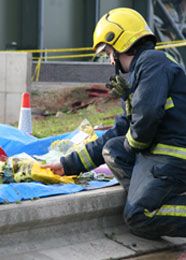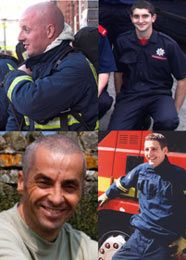 Photo Warwickshire County Council A Warwickshire firefighter lays flowers in tribute to his four fallen brothers. |
It was just about midnight when I received a text from a friend that a firefighter had been killed at an incident in Warwickshire in Central England.
I quickly turned on the BBC News channel to see what was happening. Across the screen was the breaking news that a firefighter had died and three were missing at a large warehouse fire in a rural area.
Seeing the live images of the blazing building and hearing that the other three had been missing for more than three hours, I knew the worst had happened.
This is not the high-risk world of mining or even being involved in a submarine accident, where people are often rescued from the lucky air pocket hours or days after the event. This is firefighting: we have a cruel and unforgiving mistress in fire and she rarely shows mercy. I knew the missing firefighters were already dead.
These guys were the fourth, fifth, sixth and seventh firefighters to die in the line of duty in the UK in a year. What on earth has gone wrong? Firefighter deaths in the UK had become almost non-existent through the 90s. In the post war years, firefighting was still a brutal and tough job, and firefighters often paid the ultimate price because of equipment and procedures that were in the Dark Ages.
But gradually this changed, and lessons were learned nationally from disastrous fires in London, Glasgow, Manchester and other towns and cities that were killing our forefathers. World-beating advances in safe systems of work and command procedures were developed that would go on reduce losses.
Safer decades
With the exception of some notable incidents in London and Glasgow in the late 60s and early 70s where large numbers were killed, firefighting as a profession began to get much safer. By the 1990s, firefighter deaths had become very rare indeed. On average, there was one every year among the 60,000 of us in the UK. Even massive, busy brigades such as mine — London — had no deaths at all between 1993 and 2004.
It would seem that the seeds of change were first sewn in the late 1990s. Following reports that too many members of the public were losing their lives in fires, a campaign to educate the community was introduced in some of the large metropolitan brigades that was soon to roll out across the whole of the UK.
| In Memory |
This article is dedicated to the memory of the UK firefighters lost in recent years.
Robert Miller, Leicestershire Fire & Rescue Service, October 2002.
Alex Kent**, East Sussex Fire & Rescue Service, January 2003.
Andrew Clinton, West Midlands Fire Service, March 2003.
Graham Hughes, Greater Manchester Fire Service, March 2003.
Mick Wood*, Greater Manchester Fire Service, May 2003.
Joe McCloskey, Northern Ireland Fire Brigade, November 2003.
Richards Jenkins, South Wales Fire & Rescue Service, May 2004.
Bill Faust, London Fire Brigade, July 2004.
Adam Meere, London Fire Brigade, July 2004.
Michael Miller, Hertfordshire Fire & Rescue Service, February 2005.
Jeff Wornham, Hertfordshire Fire & Rescue Service, February 2005.
Mick Bird*, Leicestershire Fire & Rescue Service, September 2006.
Geoff Wicker, East Sussex Fire & Rescue Service, December 2006.
Brian Wembridge, East Sussex Fire & Rescue Service, December 2006.
Paul Mallaghan, Hertfordshire Fire & Rescue Service, June 2007.
Gary Telfer, Dumfries & Galloway Fire Service, July 2007.
Ian Reid, Warwickshire Fire & Rescue Service, November 2007.
John Averis, Warwickshire Fire & Rescue Service, November 2007.
Darren Yates-Badeley, Warwickshire Fire & Rescue Service, November 2007.
Ashley Stephens, Warwickshire Fire & Rescue Service, November 2007.
*Died at incident as a result of illness
** Killed whilst attempting to rescue family member from a fire whilst off duty
At the time, we were told that “Community Fire Safety” or CFS was now as important as firefighting itself. Many older, experienced heads laughed at this — too many people had been around too long and knew Joe Public all too well. People in the UK have a high fear of crime but no one ever thinks a fire will happen to them, so CFS was seen as a waste of time by many.
In the early part of the new millennium, CFS began to gather pace and with an increase in the ownership of smoke alarms, the number of fire deaths actually did fall. But bolstered by this, the political decision makers in the UK Fire Service decided that we would do more and more CFS work.
Then, in 2002/2003, tired of worsening pay and conditions, the UK Fire Service entered into a bitter and drawn out industrial dispute with Tony Blair’s government. When the dispute came to an end, firefighters were promised more of a living wage. But the fire service here was about to change beyond all recognition: the 1947 Fire Services Act was ripped up and the 2004 Fire and Rescue Act introduced.
All of a sudden, the rescue work that had long been part of our role, but wholly unrecognised by government, was now officially ours. We were promised a 21st Century fire service to face the needs of the modern world. However, alongside this, CFS had really become a big part of what we were doing and crews were now spending hours of their time carrying out home fire safety visits, peddling smoke alarms at supermarkets and dropping leaflets through street doors.
Good aspects
There is no argument to state that CFS is a bad thing. Like most career firefighters, I have seen numerous fire deaths and if I never see another it won’t be too late. But instead of investing in dedicated staff to carry out CFS work within the local community, we were now expected to spend up to 10 percent of our on-duty time carrying out CFS as well as training in the host of new skills and equipment that had come our way after 9/11.
No longer did we just have to respond to the aftermath of conventional terrorism that we had become used to over the past 30 years. We were now on the frontline against the threat of catastrophic global terrorism, CBRN threats, chemical attack or whatever else would be thrown our way.
Something had to give — and that something has been training in the core skills of firefighting. The effects can be clearly seen. In July 2004, the London Fire Brigade lost two men while tackling a shop and dwelling fire. A number of small oversights had allowed a situation to develop where a rapid escalation in the fire left the two firefighters exposed and hopelessly under-gunned in a burning basement. Bill Faust, 36, an eight-year LFB firefighter and Adam Meere, 27, a probationary firefighter, had become the LFB’s first deaths in more than 11 years.
London wasn’t the only place. Since 2003, firefighters have also been killed across England and Northern Ireland. We’ve started to lose three or four people in a year, something we’re not used to in recent times.
Soon it became apparent that firefighters were getting killed in “bread and butter” jobs, the type that were previously being fought day in, day out across the UK without a problem.
Clear problem
There is plenty of speculation about what happened at the Warwickshire fire last weekend, and it’s unfair for me to add to it as the fallen have not even been laid to rest yet. But it is clear to lots of observers and commentators in the UK Fire Service, including experienced firefighters and officers, union officials and some chiefs, what the problem is.
In 2004 we were promised a modernised fire service here. Yes, there has been a lot of new equipment to face the increased terrorism threat. And training in these areas as well as other disciplines such as USAR and CBRN have improved greatly. However, services in some areas have been reduced. Whole-time career stations have been downgraded to part time and in some areas part-time stations have been closed altogether. Firefighters seem to be spreading themselves way too thinly.
 Photo Warwickshire County Council Clockwise from top left: Darren Yates-Badley, Ashley Stevens, Ian Reid and John Averis. |
When I joined in the 1980s, a lot of the time that I was not on incidents was spent on the training ground or in the lecture room. We would be out looking at the risks in our area, looking and getting to know large premises such as the one that burned down last week. Where specialist training was required, we would have dedicated trainers sent to the station instead of a DVD lecture package, which relies on the skill of the often inexperienced officer to deliver.
Now as a Chief, I see that my Watch Officers try to spend good, quality time teaching the young firefighters new skills and refreshing their basic ones. However, they have to do this and fit in a couple of home fire safety checks in a day, as well as being tied to the computer providing returns for this one and numbers for that one.
We too have become slaves to the computer and the e-mail, with every message demanding something more important and more of a priority than the previous one. Too much has happened too quickly. Like most UK public services, we are now driven by targets that are often impossible to achieve and have little bearing on the job we do.
I am as proud as I have always been to be a firefighter in the UK, especially a “London Fireman.” Both in London and the rest of the UK, we have a very good record on civilian casualties and an excellent record on firefighter casualties.
However, the recent increase in firefighter deaths is an indication that it’s a little bit more than just “one of those things.” We’ve worked too hard, we have lost too many in previous generations for this to carry on. It’s time we got back to basics — back to what we are here for.

